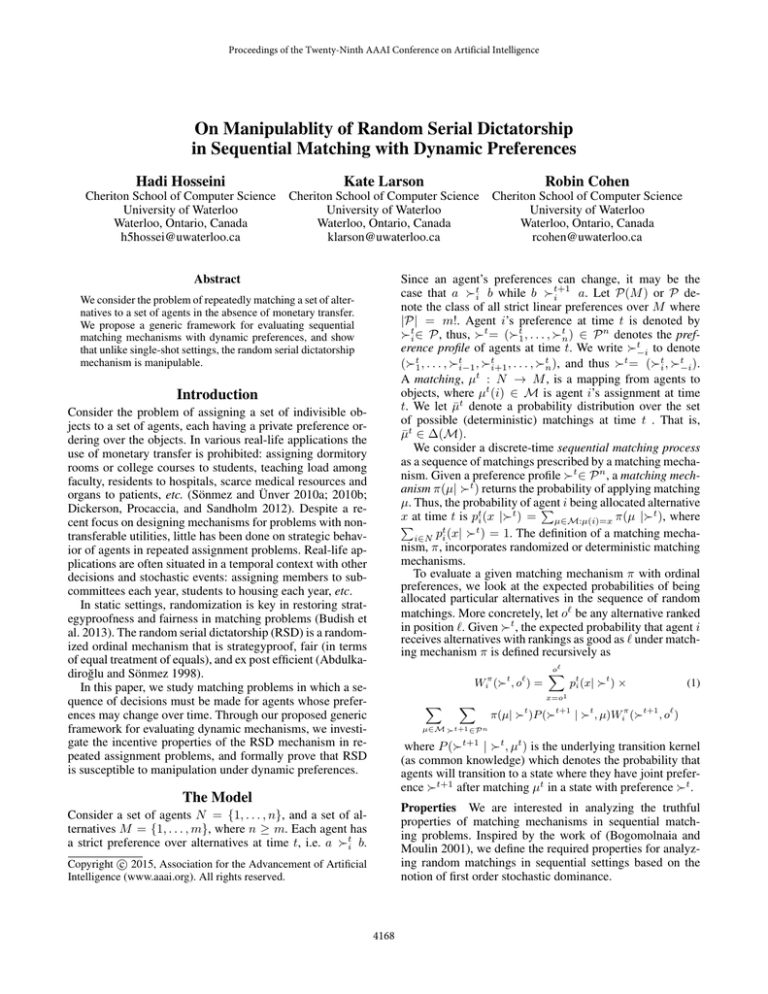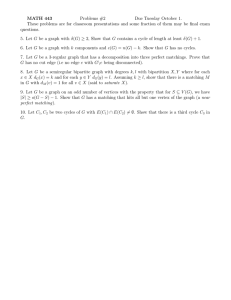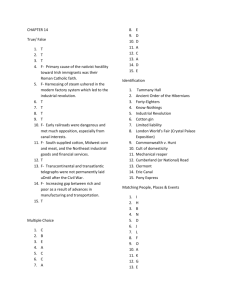
Proceedings of the Twenty-Ninth AAAI Conference on Artificial Intelligence
On Manipulablity of Random Serial Dictatorship
in Sequential Matching with Dynamic Preferences
Hadi Hosseini
Kate Larson
Robin Cohen
Cheriton School of Computer Science
University of Waterloo
Waterloo, Ontario, Canada
h5hossei@uwaterloo.ca
Cheriton School of Computer Science
University of Waterloo
Waterloo, Ontario, Canada
klarson@uwaterloo.ca
Cheriton School of Computer Science
University of Waterloo
Waterloo, Ontario, Canada
rcohen@uwaterloo.ca
Abstract
Since an agent’s preferences can change, it may be the
case that a ti b while b t+1
a. Let P(M ) or P dei
note the class of all strict linear preferences over M where
|P| = m!. Agent i’s preference at time t is denoted by
ti ∈ P, thus, t = (t1 , . . . , tn ) ∈ P n denotes the preference profile of agents at time t. We write t−i to denote
(t1 , . . . , ti−1 , ti+1 , . . . , tn ), and thus t = (ti , t−i ).
A matching, µt : N → M , is a mapping from agents to
objects, where µt (i) ∈ M is agent i’s assignment at time
t. We let µ̄t denote a probability distribution over the set
of possible (deterministic) matchings at time t . That is,
µ̄t ∈ ∆(M).
We consider a discrete-time sequential matching process
as a sequence of matchings prescribed by a matching mechanism. Given a preference profile t ∈ P n , a matching mechanism π(µ| t ) returns the probability of applying matching
µ. Thus, the probability of agent
P i being allocated alternative
x at time t is pti (x |t ) = µ∈M:µ(i)=x π(µ |t ), where
P
t
t
i∈N pi (x| ) = 1. The definition of a matching mechanism, π, incorporates randomized or deterministic matching
mechanisms.
To evaluate a given matching mechanism π with ordinal
preferences, we look at the expected probabilities of being
allocated particular alternatives in the sequence of random
matchings. More concretely, let o` be any alternative ranked
in position `. Given t , the expected probability that agent i
receives alternatives with rankings as good as ` under matching mechanism π is defined recursively as
We consider the problem of repeatedly matching a set of alternatives to a set of agents in the absence of monetary transfer.
We propose a generic framework for evaluating sequential
matching mechanisms with dynamic preferences, and show
that unlike single-shot settings, the random serial dictatorship
mechanism is manipulable.
Introduction
Consider the problem of assigning a set of indivisible objects to a set of agents, each having a private preference ordering over the objects. In various real-life applications the
use of monetary transfer is prohibited: assigning dormitory
rooms or college courses to students, teaching load among
faculty, residents to hospitals, scarce medical resources and
organs to patients, etc. (Sönmez and Ünver 2010a; 2010b;
Dickerson, Procaccia, and Sandholm 2012). Despite a recent focus on designing mechanisms for problems with nontransferable utilities, little has been done on strategic behavior of agents in repeated assignment problems. Real-life applications are often situated in a temporal context with other
decisions and stochastic events: assigning members to subcommittees each year, students to housing each year, etc.
In static settings, randomization is key in restoring strategyproofness and fairness in matching problems (Budish et
al. 2013). The random serial dictatorship (RSD) is a randomized ordinal mechanism that is strategyproof, fair (in terms
of equal treatment of equals), and ex post efficient (Abdulkadiroğlu and Sönmez 1998).
In this paper, we study matching problems in which a sequence of decisions must be made for agents whose preferences may change over time. Through our proposed generic
framework for evaluating dynamic mechanisms, we investigate the incentive properties of the RSD mechanism in repeated assignment problems, and formally prove that RSD
is susceptible to manipulation under dynamic preferences.
`
Wiπ (t , o` ) =
o
X
pti (x| t ) ×
(1)
x=o1
X
X
π(µ| t )P (t+1 | t , µ)Wiπ (t+1 , o` )
µ∈M t+1 ∈P n
where P (t+1 | t , µt ) is the underlying transition kernel
(as common knowledge) which denotes the probability that
agents will transition to a state where they have joint preference t+1 after matching µt in a state with preference t .
The Model
Properties We are interested in analyzing the truthful
properties of matching mechanisms in sequential matching problems. Inspired by the work of (Bogomolnaia and
Moulin 2001), we define the required properties for analyzing random matchings in sequential settings based on the
notion of first order stochastic dominance.
Consider a set of agents N = {1, . . . , n}, and a set of alternatives M = {1, . . . , m}, where n ≥ m. Each agent has
a strict preference over alternatives at time t, i.e. a ti b.
c 2015, Association for the Advancement of Artificial
Copyright Intelligence (www.aaai.org). All rights reserved.
4168
For two matching mechanisms π and π 0 , stochastic dominance prescribes that given a transition model, for each rank
`, the expected probability that alternatives with rankings as
good as ` get selected under π, is greater or equal to the expected probability that π 0 selects such alternatives.
1 :
2 :
3 :
∀o` ∈ M, Wiπ (t , o` ) ≥ Wiπ (t , o` )
o1
o2
o3
(2)
Global strategyproofness is an incentive requirement
which states that under any possible transition of preference profiles, no agent can improve her sequence of random matchings by a strategic report. A one-shot matching
mechanism coincides precisely with the random assignment
problem (Abdulkadiroğlu and Sönmez 1998; Bogomolnaia
and Moulin 2001).
t
1 :
2 :
ˆ3 :
acb
bca
abc
W3 (t , o` )
3
3
2
6 × 6 (µ̄µ1 )
1 × 36 [µ̄2µ1 + µ̄2µ2 ]
1 × 36 [µ̄2µ1 + µ̄2µ2 ]
ˆ ti , t−i ), o` )
W3 ((
3
3
2
6 × 6 (µ̄µ1 )
5
2
3
2
2
×
[
(µ̄
µ1 ) + 6 (µ̄µ2 )]
6
6
3
2
2
2
1 × [ 6 (µ̄µ1 ) + 6 (µ̄µ2 ) + 16 (µ̄2µ3 )]
Table 2: Evaluation of the matching mechanism for agent 3.
agent 3 misreports (Table 1b), the probability distribution
would be ( 26 µ1 , 36 µ2 , 16 µ3 ) = ( 62 abc, 36 cba, 16 acb). Assuming truthfulness in the second period, given a preference profile, identical decisions always result in identical next states.
For each ranking position `, we compute W3 (·, o` ) as shown
in Table 2. For o1 and o2 , the truthful revelation stochastically dominates the matching decisions when agent 3 is
non-truthful. For strategyproofness we must show that for
o3 , 1 × 63 [µ̄2µ1 + µ̄2µ2 ] ≥ 1 × [ 36 (µ̄2µ1 ) + 62 (µ̄2µ2 ) + 16 (µ̄2µ3 )].
By simple algebra, we see that for all preferences at the second period wherein agent 3’s assignment under µ̄2µ3 stochastically dominates µ̄2µ2 the above inequality does not hold.
Thus, sequential RSD is not globally strategyproof.
Definition 2. A matching mechanism is globally strateˆ ti at
gyproof iff for all transitions P , given any misreport t
t
ˆ = (
ˆ i , t−i ), for all agents i ∈ N ,
time t such that ˆ , o` )
∀o` ∈ M, Wiπ (t , o` ) ≥ Wiπ (
acb
bca
acb
Table 1: Preferences revealed by three agents.
Definition 1. Given a transition model P , matching mechanism π stochastically dominates π 0 , if at all states t ∈ P n ,
for all agents i ∈ N ,
0
(b) Misreport
(a) Truthful
(3)
A matching is Pareto efficient if there is no other matching
that makes all agents weakly better off and at least one agent
strictly better off. A random matching is ex post efficient if
it can be represented as a probability distribution over Pareto
efficient deterministic matchings.
Concluding Remarks
We showed that in dynamic settings, RSD is susceptible to
manipulation. Due to the incompatibility of strategyproofness and efficiency, we only focused on incentive properties
of random mechanisms. The aim, in the future, is to evaluate
the efficiency of such mechanisms and design truthful mechanisms that satisfy some approximate notion of efficiency.1
Sequential RSD
Random serial dictatorship randomly assigns a priority ordering to agents, and then the first agent in the ordering receives her favorite (the most preferred) alternative, the next
agent receives his favorite alternative among the remaining ones, and so on. In single-shot settings, RSD is strategyproof, fair (in terms of equal treatment of equals), and ex
post efficient (Abdulkadiroğlu and Sönmez 1998).
References
Abdulkadiroğlu, A., and Sönmez, T. 1998. Random serial dictatorship and the core from random endowments in house allocation
problems. Econometrica 66(3):689–701.
Bogomolnaia, A., and Moulin, H. 2001. A new solution to the random assignment problem. Journal of Economic Theory 100(2):295–
328.
Budish, E.; Che, Y.-K.; Kojima, F.; and Milgrom, P. 2013. Designing
random allocation mechanisms: Theory and applications. The American Economic Review 103(2):585–623.
Dickerson, J. P.; Procaccia, A. D.; and Sandholm, T. 2012. Dynamic matching via weighted myopia with application to kidney exchange. In Proceedings of the AAAI Conference on Artificial Intelligence, 1340–1346.
Hosseini, H.; Larson, K.; and Cohen, R. 2015. Matching with dynamic ordinal preferences. In Proceedings of the AAAI Conference
on Artificial Intelligence, forthcoming.
Sönmez, T., and Ünver, M. U. 2010a. Course bidding at business
schools. International Economic Review 51(1):99–123.
Sönmez, T., and Ünver, M. U. 2010b. House allocation with existing tenants: A characterization. Games and Economic Behavior
69(2):425–445.
Theorem 1. With fixed preferences, sequential RSD (a sequence of RSD induced matchings) is globally strategyproof,
and yields a sequence of ex post efficient matchings.
Proof. RSD is strategyproof in each period, thus, no agent
can immediately benefit from misreporting. With fixed preferences, an agent’s misreport does not affect the sequence of
decisions, implying sequential RSD is strategyproof.
While RSD satisfies strategyproofness at each period, we
argue that a sequence of independent RSD induced random matchings (or sequential RSD) is prone to manipulation
when agents have dynamic preferences.
Theorem 2. With dynamic preferences, sequential RSD is
not globally strategyproof.
Proof. Consider 2 decision periods with deterministic preference dynamics known to agents. Let µ̄2µ1 denote the random matching at t = 2 after assignment µ1 at t = 1.
With truthful preferences (Table 1a), RSD induces the following random matching: ( 12 µ1 , 12 µ2 ) = ( 21 abc, 12 cba). If
1
More details on the overarching research is in (Hosseini, Larson, and Cohen 2015).
4169




